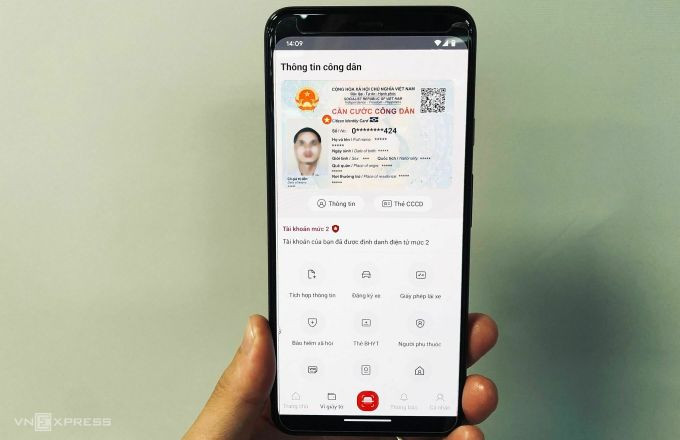From July 1, each citizen will be issued an electronic ID card to carry out administrative procedures, public services and other transactions, instead of having to carry a hard copy ID card.

The 2023 Law on Identification, effective from July 1, stipulates that each Vietnamese citizen is granted an electronic identification card (e-ID), created by the Ministry of Public Security as soon as they have a level 2 electronic identification account on the VNeID application.
Electronic ID includes information in the ID card, such as full name, personal identification number, nationality, place of birth, hometown, religion, blood type, permanent residence, temporary residence, phone number, email, occupation (except police, military, cryptography), identification information such as face, fingerprint, iris...
Health insurance cards, social insurance books, driver's licenses, birth certificates, and marriage certificates (except for documents issued by the Ministry of National Defense) will be integrated into the electronic ID card, if citizens so request. This information must be authenticated through the national database and specialized databases.
Citizens use electronic identification cards to carry out administrative procedures, public services, and other civil transactions and activities. In the coming time, the Government will stipulate the procedures for issuing electronic identification cards to citizens.
When making transactions, if there is a difference between the information on the ID card and the information in the electronic ID, the agency, organization or individual using the information from the electronic ID.
The electronic ID card is locked when the owner requests it or violates the agreement to use the national identification application. In case the citizen's ID card is revoked or retained, or dies, the electronic ID card is also locked. The prosecution agency or competent authority has the right to request the locking of the electronic ID card.
After the owner requests to lock the electronic ID, if there is a request to unlock it, it will be responded to. In case of lock due to violation, the electronic ID will be unlocked when the person has corrected it. If the revoked ID card is returned, the electronic ID will also be unlocked. The prosecution agency and competent authority are also requested to unlock the electronic ID.
Citizens will receive notification if their e-ID is locked. The government will prescribe the procedure for locking and unlocking e-ID.
Electronic ID cards have been widely used in many countries around the world for a long time. In addition to storing personal information, e-IDs are also used in many areas such as health insurance, electronic payments, signing electronic documents with digital signatures, buying public transport tickets and even voting.
Finland first issued e-IDs to citizens in 1999 by banks, allowing people to log in to local agencies, universities, banks and make large payments using mobile payment services.
Estonia has issued e-IDs since 2002, provides electronic public services and was the first country to introduce mobile voting in 2011.
The e-ID was piloted in six regions in Indonesia in 2009 and launched nationwide in 2011.
In 2018, China partnered with e-wallet platform Alipay to pilot the issuance of electronic ID cards and QR codes in several major cities, and then expanded to many other places. By scanning QR codes on their phones, people can use public services, book rooms, and buy train tickets without having to carry a physical ID card. However, to date, the use of electronic ID cards has not been popular in China due to lack of coordination between departments, and people still need to present physical ID cards.
TB (according to VnExpress)